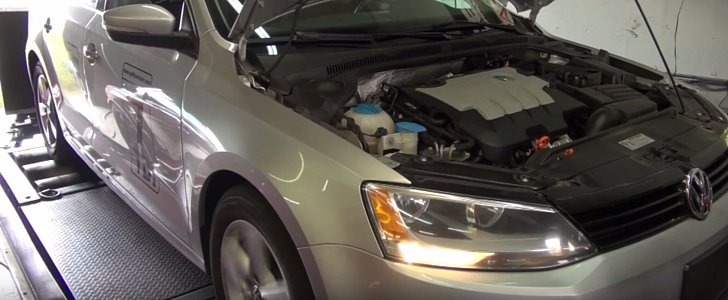Ever wondered how it feel to drive around in a car with multiple personalities? Owners of the 11 million Volkswagens affected by the Dieselgate scandal could probably answer that question, since the defeat device makes their engines a bit schizophrenic.
For those of you who have been living behind a wall of diesel smoke (yes, we know, this is an obNoxious joke), the defeat device installed on VW Group cars senses when the car is being tested and changes engine parameters via the ECU. While the emissions drop, so do the hp and the torque.
However, we now have a practical answer for the question above. It all has to do with a Dieselgate car being strapped to a dyno. As a result, we can see the exact hp and torque difference between the street driving and emission testing modes of the car.
The vehicle in question is a US-spec 2011 VW Jetta TDI with a DSG gearbox, which the team over at TFL Car took to the rolling road room.
The TDI was tested on an all-wheel-drive dyno, whose rollers are belt-driven. The first test saw the car being driven with all four wheel spinning, imitating the real world driving cycle. As for the second run, this was performed with only the front wheels spinning, which determined the defeat device to switch to the emission testing setting of the ECU.
Instead, we want to talk about the difference between the numbers above and the emission mode output, which sits at 136.5 hp and 228.4 lb-ft (310 Nm). While the torque drop is significant, the hp one can almost be ignored, but the problem goes deeper than that.
Checking out the hp and tq curves reveals a significant difference throughout the rev range. And since we don’t redline our diesel as if they were anti-lag petrol racecars, the loss at lower rpm is much more important. Factor in the maximum drop of 15 hp 32 lb-ft (43 Nm) and you know there’s a problem.
However, we now have a practical answer for the question above. It all has to do with a Dieselgate car being strapped to a dyno. As a result, we can see the exact hp and torque difference between the street driving and emission testing modes of the car.
The vehicle in question is a US-spec 2011 VW Jetta TDI with a DSG gearbox, which the team over at TFL Car took to the rolling road room.
The TDI was tested on an all-wheel-drive dyno, whose rollers are belt-driven. The first test saw the car being driven with all four wheel spinning, imitating the real world driving cycle. As for the second run, this was performed with only the front wheels spinning, which determined the defeat device to switch to the emission testing setting of the ECU.
Here are the numbers
While VW rates the car at 140 hp and 236 lb-ft (320 Nm), in road condition, the Jetta delivered an excellent 138.5 hp and 260 lb-ft (353 Nm). While the dyno graph did use an altitude correction factor, we’re not here to discuss why these claimed wheel numbers match VW’s crank figures.Instead, we want to talk about the difference between the numbers above and the emission mode output, which sits at 136.5 hp and 228.4 lb-ft (310 Nm). While the torque drop is significant, the hp one can almost be ignored, but the problem goes deeper than that.
Checking out the hp and tq curves reveals a significant difference throughout the rev range. And since we don’t redline our diesel as if they were anti-lag petrol racecars, the loss at lower rpm is much more important. Factor in the maximum drop of 15 hp 32 lb-ft (43 Nm) and you know there’s a problem.


